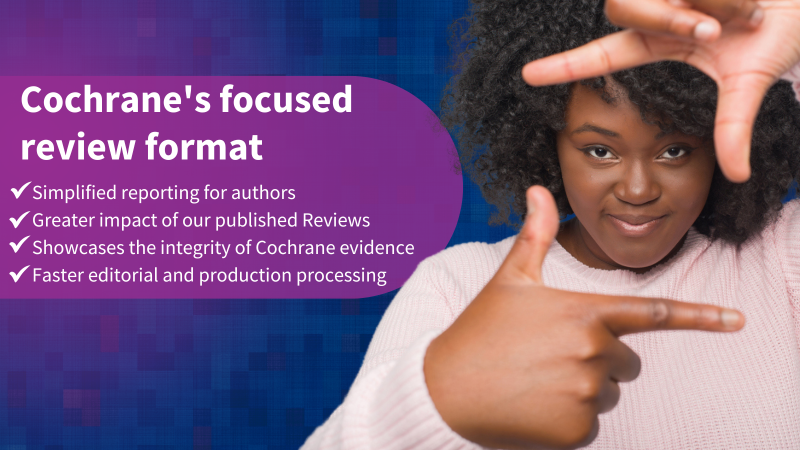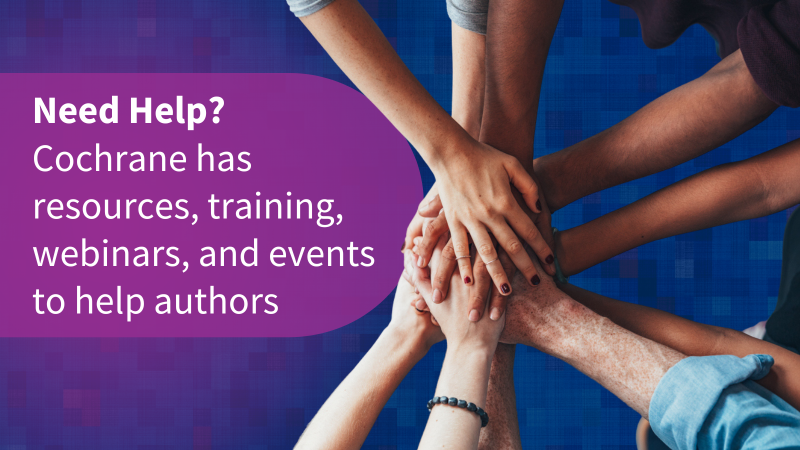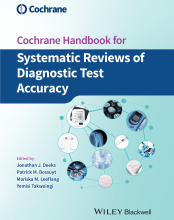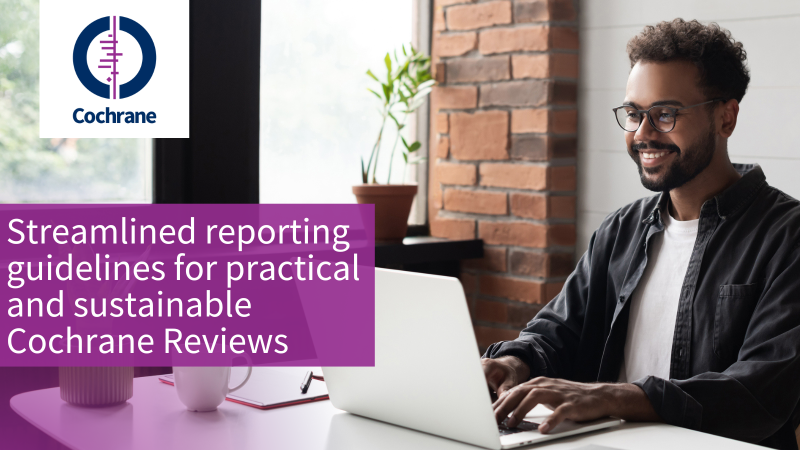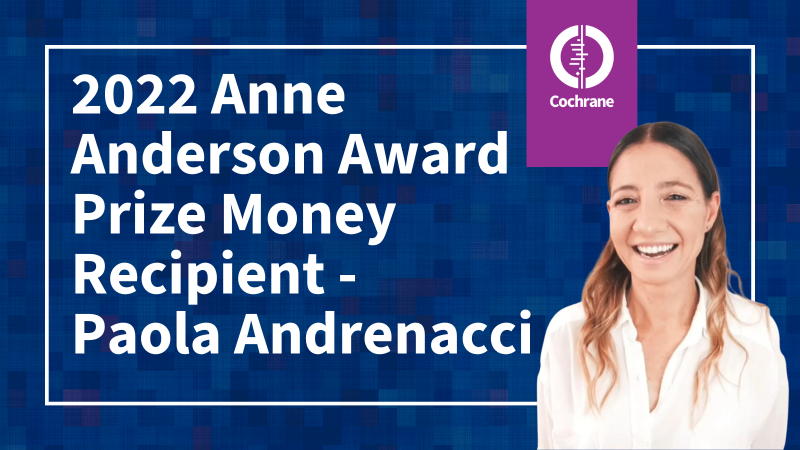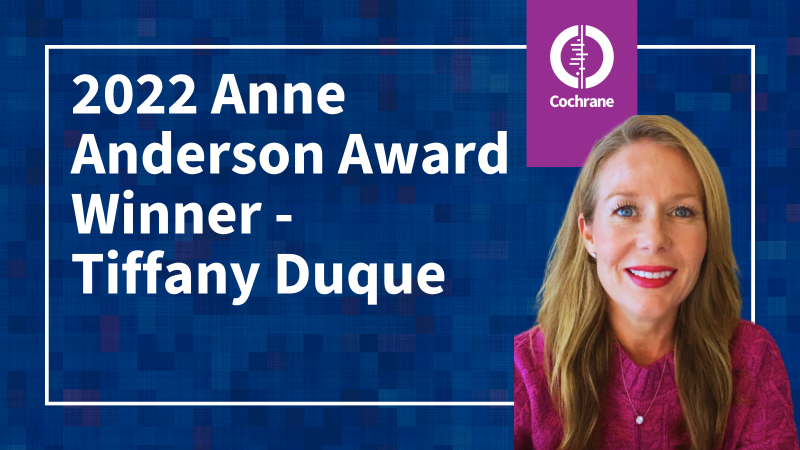Roses Parker started with Cochrane in 2019 as a Network Support Fellow and is now a Commissioning Editor in the Evidence Production and Methods Directorate. Roses has previously held roles as a Staff Nurse, Data Analyst, and Research Assistant, all standing her in good stead for the role. Here, Roses explains how her new role will help commissioning and her hopes for the upcoming Cochrane Colloquium.
Roses, thanks for talking to us. Can you explain in more detail what your role as Commissioning Editor involves at Cochrane and why it’s important?
“As Cochrane’s new Commissioning Editor, it is my role to identify high-priority updates and new reviews and help completion go as smoothly as possible. It is important that we direct our resources towards projects which will matter to our stakeholders and my role exists to support that happening. The health landscape is constantly changing with new treatments, new systems of delivery, and new diagnostic approaches. Through collaboration with a wide range of experts from Cochrane’s community, we can work out which health questions require interrogation with systematic reviews. I also help to make sure that we have wide coverage in our content and that what we are producing matches global health evidence needs. I work with the Cochrane community to formulate the right research questions with the right methods. I also think about ways to ensure that the author team has sufficient clinical and methodological experience.”
Can you explain a little about how the process of commissioning contributes to supporting review development? Particularly addressing the most pressing queries from our users.
“Once those priorities are identified, I try to ensure that things move quickly! A key part of my role is the links I have with our Evidence Synthesis Development Editors (who you might know as the Dev team) and our Methods Support Unit (MSU). The Dev team help authors stick to the scope of the review, ensure the correct methods are used to answer the review questions, provide advice on interpreting results and summarising findings/GRADE evidence. They can then help bring it all together to write a discussion. This type of support means having an assigned contact person throughout all stages of the development of the review and checking in with them every month or so. MSU is available to help unpick complex methodological issues. They offer support to authors and editors by responding to questions about methodological and statistical issues and also offering pre-submission guidance, which can anticipate some of the issues that might come up during peer review. They run monthly web clinics which act as a forum for the discussion of important and novel methods issues, with past recordings available on the Cochrane Training website. A third workstream is the production of accessible resources for authors and editors, for example, the information about the Risk of Bias 2 tool on the Cochrane Methods website. Extra time spent working with these teams pre-submission can pay dividends down the line and makes things simpler for everyone, ensuring that the route to publication is as smooth as possible.”
How do you view the role of author-initiated proposals, thematic groups or CRGs priority setting within the framework of commissioning?
“The short answer is that all of these have a vital role to play in commissioning! Decisions are never made in isolation. The clinical and academic insight offered by authors, Thematic Groups, and CRGs is invaluable. I see commissioning as working hand-in-hand with priority setting, facilitating both the process and the results. Where up-to-date priority-setting processes exist, I work through these carefully, using data and expert opinion, and input from author teams. In the future, I hope to work collaboratively with Thematic Groups and Review Groups to create robust, transparent, and workable priority-setting processes which delve into the most important health questions globally. I hope we can ensure that the quality of our end reviews is high wherever possible whilst keeping the process pragmatic and feasible. I’m excited to commission different types of reviews as well as intervention reviews. We also need to embrace the complex questions of why interventions might work, and in which circumstances. I’m looking forward to working with Thematic Groups and Review Groups in their priority-setting to help ensure these types of questions are considered.“
“In the future, I hope to work collaboratively with Thematic Groups and Review Groups to create robust, transparent and workable priority-setting processes”
How important is it in your role to build good relationships with the Cochrane Community and beyond?
“Building good relationships is what I love most about this role. I work with methods teams, information specialists, the Editorial Service, the comms team, Executive Leadership colleagues, Thematic Groups, Cochrane Review Groups, consumers, guideline developers, policymakers, clinicians, academics, and authors! These relationships are essential to my role. I really want the Cochrane Community to know who I am, what my role entails, and why and when to contact me. They need to know I am approachable and interested in their work. I am networking in the most literal sense of the word: I am building links with lots of different people and groups in the hope of collaborating and growing connections when opportunities come up. I have my ear to the ground because I need an awareness of what activity is going on all over Cochrane and beyond.”
How does the use of data help inform your decisions about updates? What other information do you usually draw on?
“When I’m commissioning updates, I use a variety of data sources to help understand the importance and impact of a review. Citation data provides primarily the academic impact of a review which is important especially when the review highlights a gap in research and - of course - our Impact Factor. Guideline data shows how our work is being applied at a policy level. Altmetric data provides some insight into how Cochrane reviews are used by a lay audience (although clinicians and academics are also reflected here). Finally, usage data shows how frequently the Cochrane Library is accessed for each review, which is a good overall metric.
I also consider the search date in context with the field. If a review is old but the field is static, then the review may be relevant and still in date. If the field is fast-moving, then even a recent search date may be out of date. The number of ongoing studies gives me an indication of this, and I work with the centralised search team who can run scoping searches and help with surveillance. Occasionally the Summary of Findings tables present only high-certainty evidence. When that is the case, I can consider whether the research question has been answered. All this gives me a good indication of whether an update is due, but I always make sure I have a clinical or academic opinion before progressing to commission.”
How does that combine with the expertise and huge range of knowledge of topics and reviews that our community members have?
“I have some clinical knowledge from my previous roles, but I don’t consider myself to be an expert in any of the areas in which I am commissioning. That’s where the Cochrane Community comes in. We have a fantastic, helpful community with a very wide range of expertise. I never make commissioning decisions based on data alone. I always need an expert opinion, so I talk to both internal and external stakeholders constantly. The Cochrane community is full of experts willing to donate their time and knowledge to support our vision and mission. This part of my role focuses on effective collaboration.”
“The Cochrane community is full of experts willing to donate their time and knowledge to support our vision and mission”
How do you approach the complex task of aligning both published and ongoing content with strategically important themes like Health Equity, which will increasingly play a part in Cochrane’s future output?
“The pursuit of health equity is something I am very passionate about. I see eliminating (or at least minimising) health inequality as my moral duty, and I’m grateful for the opportunity to pursue this professionally. I’m looking forward to putting the needs of those most in need at the heart of what Cochrane does. I’m sure that many within Cochrane feel the same. Society is now interlinked, and Covid demonstrated that while we are one global community, health outcomes within that community are unequal. Reducing health inequalities helps everyone. The United Nations Sustainable Development Goals provide a helpful framework for achieving this, but the practicalities around this are, of course, more challenging. We are navigating significant change in how we produce evidence and expanding the type of evidence we produce. There may be some uncertainty and discomfort while we change but taking our time means we should get the direction right. I think we will all need to adopt a certain level of pragmatism in the interim!
Creating structure around themes such as the Sustainable Development Goals has its own complications. I wish that health could be easily divided into neat areas, but it can’t, the reality is that it is messy and complicated. We will need to be creative in our approach and the result needs to be flexible as global health needs change. Having said all that, I love the challenge this presents. And I’m grateful for the positivity, momentum, and collaboration of the team as we approach the task.”
Finally, what are you looking forward to hearing about at the upcoming Cochrane Colloquium and who are you most keen to meet?
“So much! My first and only Cochrane Colloquium was Santiago in 2019, and I’m still benefiting from the relationships I built there. The program is impressive and deciding what not to go to will be the most difficult thing. Unsurprisingly, I am attracted to anything with an equity focus as well as having an interest in priority setting, and stakeholder engagement sessions. I’m excited to meet my team face-to-face as we’ve not had that opportunity so far. There have been many people I’ve already collaborated with but never met in person. And of course, I’m looking forward to meeting new people too and forging relationships that will support my role in the future.”




